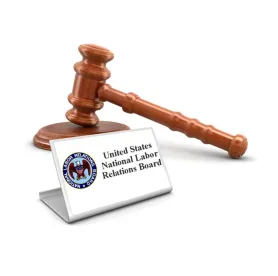We’ve all been on notice for some time that the current General Counsel of the National Labor Relations Board (NLRB or Board), as well as a majority of the Board itself, has an aggressively expansive view of employee rights under the National Labor Relations Act (NLRA or Act).
And it follows that, as the contours of employee protected activity are extended, so too does the potential for claims against employers for alleged interference with employee rights.
Now, as a complement to swelling employee rights on the one hand, and burgeoning employer exposure to claims on the other, the Board recently addressed the third hand: expanding liability for employer unfair labor practices. On April 20, 2023, the Board issued a decision in Noah’s Ark Processors, LLC d/b/a WR Reserve, describing far-reaching remedies it may consider in cases where it concludes employers have demonstrated repeated or egregious disregard for employees’ rights under the NLRA.
Background
In WR Reserve, the Board found that a Nebraska meat processor repeatedly violated the NLRA when it failed to bargain in good faith with the union representing its employees. The parties’ ongoing negotiations began in 2018, when the employer was previously cited for bad faith bargaining in unfair labor practice cases before the Board, a Section 10(j) federal court injunction, contempt findings, and related sanctions. Compounding matters, the Board held the employer’s prior bad faith tainted its declaration that bargaining had reached an impasse, rendering the employer’s unilateral implementation of its last and best bargaining proposals unlawful.
In light of these findings, the Board approved issuing so-called “standard” remedies for the employer’s unlawful conduct. Further, the Board concluded that the employer’s particular misdeeds justified imposing so-called “additional” remedies to the standard remedies. And, in a move reminiscent of Dean Wormer putting Delta house on “double secret probation,” the Board determined that still additional-additional remedies were warranted where the employer had “shown a proclivity to violate the Act or . . . engaged in egregious or widespread misconduct.”
NLRB Remedies
Attempting to parse the remedies upon remedies in WR Reserve may be like carrying coals to Newcastle. Indeed, the key takeaway for employers in the case is that the Board has broad discretion under Section 10(c) of the Act to remedy unfair labor practices, including by directing “such affirmative action . . . as will effectuate the policies of th[e] Act.” That said, the Board’s escalating schedule of potential remedial actions is instructive:
Standard remedies
-
Issuance of a cease-and-desist order, restricting the employer from engaging in bad faith bargaining, and the other specific unlawful acts at issue in the case.
-
Ordering the employer to withdraw its unilaterally implemented proposals and make employees whole for any pecuniary losses incurred as a result of that implementation.
-
Ordering the employer to post a Board-issued Notice, acknowledging and disavowing the employer’s unlawful conduct, and assuring employees of their rights under the Act.
Additional remedies
-
Issuance of a “broad” cease-and-desist order, which goes beyond the “standard”
cease-and-desist and the specific allegations and findings in the case, and broadly restricts the employer from engaging in any other conduct that interferes with employees’ exercise of protected rights. (In this way, the broad cease-and-desist is more adaptable as a basis for future charges of recidivism). -
Issuance of an “affirmative” bargaining order — beyond directing the employer to stop bargaining in bad faith, the order affirmatively mandates the employer to bargain in good faith — which carries the further “remedial” consequence of insulating the union against decertification for a period of time.
-
Ordering the employer to reimburse the union for bargaining expenses incurred (including lost earnings for the union’s bargaining committee members) from the date the employer unlawfully declared impasse until the date when good faith negotiations begin.
-
Ordering the employer to hold an all-employee meeting or series of meetings at which the Board-issued notice would be read aloud by the employer’s CEO or by a Board agent in the CEO’s presence.
Double secret probation remedies (non-exhaustive list, which the Board instructed it may impose in appropriate cases)
-
Requiring employers to post a Notice and Explanation of Rights to employees.
-
Requiring employers to distribute physical copies of the Notice, in addition to posting it.
-
Requiring that the Notice be read aloud in an open forum to employees and in the presence of management and supervisors, by an employer representative (who may be a specifically designated by the Board for the oration) and/or in the presence of an NLRB official. In the Board’s words, reading the notice aloud “is a way to let in a ‘warming wind of information’ to not only alert employees to their rights but also impress upon them that, as a matter of law, their employer or union must and will respect those rights in the future.”
-
Requiring the employer to mail copies of the Notice to employees’ homes.
-
Requiring that the Notice be personally signed by “a person who bears significant responsibility in the respondent’s organization.”
-
Requiring publication of the Notice in a local publication of broad circulation and local appeal.
-
Ordering extended posting of the Notice and Explanation of Rights beyond the standard 60 days.
-
Requiring access by NLRB agents to inspect the Notice and compliance with the Board’s order.
Takeaway for Employers
As noted above, the Board’s decision in WR Reserve did not change the law. The Board has always had broad authority to issue remedies, including those specifically ordered in WR Reserve. The decision is nonetheless notable for the fact that the Board took pains to elaborate on its current remedial process in an effort to “bring greater consistency to the Board’s exercise of remedial discretion, and to better ensure that all appropriate remedies are ordered in any given case.”
While the ruling purports to implicate cases where an employer has a demonstrated history of violations of “egregious or widespread misconduct,” employers should expect the Board may begin implementing additional and additional-additional remedies with greater frequency based on findings of such misconduct.
Ari Asher also contributed to this article.




 />i
/>i

